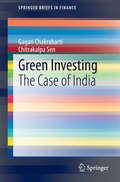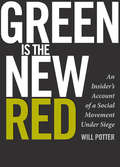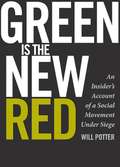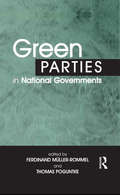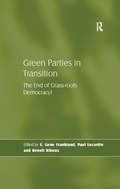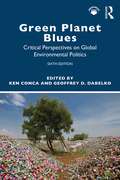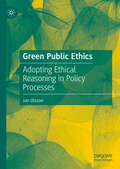- Table View
- List View
Green Investing
by Chitrakalpa Sen Gagari ChakrabartiThis book seeks to answer the essential question of the investment-worthiness of green instruments. It is evident that investing in green and energy-efficient firms will be the most profitable choice for wise investors in the years to come. The reconciliation of the social choice for green technology and investors' choice for gray technology will be automatically achieved once green firms become more profitable than gray ones, in the Indian context. As there has been very little research done in this area, especially in the Indian context, this book addresses that gap. In order to do so, it follows the development of five different portfolios consisting of 100% green, 75% green-25% gray, 50% green-50% gray, 25% green-75% gray and 100% gray stocks, and attempts to answer questions such as: Do green portfolios entail less relative own-risk as compared to their gray counterparts? How effectively do green portfolios avoid market risk? Are green portfolios inherently more stable? Do green portfolios have a higher probability of surviving a financial crisis? Is the performance of green portfolios backed by their fundamentals? Is there any particular technical trading strategy that can ensure a consistently above-average return from these portfolios?
Green Is the New Red
by Will PotterAt a time when everyone is going green, most people are unaware that the FBI is using anti-terrorism resources to target environmentalists. Here is a guided tour into an underground world of radical activism and an introduction to the shadowy figures behind the headlines. But here also is the story of how everyday people are prevented from speaking up for what they believe in. Like the Red Scare, this "Green Scare" is about fear and intimidation, and Will Potter outlines the political, legal, and public relations strategies that threaten even acts of nonviolent civil disobedience with the label of "eco-terrorism."
Green Is the New Red: An Insider's Account of a Social Movement Under Siege
by Will PotterAn insider tells how environmentalists and animal rights activists have become "the number one domestic terrorism threat."
Green Japan: Environmental Technologies, Innovation Policy, and the Pursuit of Green Growth
by Carin HolroydAs climate change continues to threaten both our economic and ecological well-being, countries around the world are trying to implement green strategies that will simultaneously curb emissions and spur economic growth. Green Japan critically examines the Japanese effort to combine economic growth with commitments to environmental sustainability. Carin Holroyd explores green growth strategies in various industries including conservation, energy, urban development, and international trade. Holroyd’s comprehensive analysis of how innovation strategies connect with environmental priorities combines a detailed study of government policies with insightful assessments of consumer and market responses. The unevenness of Japan’s success clearly demonstrates the exceptional technological innovation and creative public policy initiatives that are needed in order to successfully reverse the effects of climate change. Green Japan offers a nuanced and hopeful account of one nation’s attempts at linking environmental sustainability and continued prosperity.
Green Jasper (Book Two of the De Granville Trilogy)
by K. M. GrantIs it foolish to think that one boy and a blood red horse can save a fair maiden and the throne of England? Will and Gavin de Granville have come back from the crusade older, braver, and definitely wiser. Ellie has been longing for their return. But they've changed. And home is almost as dangerous as the war they've just left. The king is missing. The country is in turmoil. And some men would do anything for power. What will two brothers risk for the woman they both love and the king they have both sworn to protect and serve? In the second book of the de Granville trilogy, Will and Gavin find their family -- and all of England -- in serious peril.
Green Justice: The Environment And The Courts, Second Edition
by Thomas M HobanDo trees have legal rights? What risks to the environment should we legally try to control or prevent? In this updated edition of Green Justice, the authors further explore the interrelationship between the legal system and the environment, using key environmental law cases (over half of which are new selections) on such topics as population and biodiversity?and as recent as 1990. The authors' liberal arts approach leads to a wide spectrum of related topics: the history of the common law, the political science of administrative agencies, our obligation to future generations, and the ecology of species extinction.With the help of explanatory introductions, study questions, and references to relevant literature, students are challenged to determine for themselves how the cases should have been decided and how they link up to broader issues. This accessible text is ideal for undergraduate courses in environmental law and environmental policy as well as nonlaw graduate courses in planning or public administration.
Green Leviathan or the Poetics of Political Liberty: Navigating Freedom in the Age of Climate Change and Artificial Intelligence (Routledge Studies in Contemporary Philosophy)
by Mark CoeckelberghThis book discusses the problem of freedom and the limits of liberalism considering the challenges of governing climate change and artificial intelligence (AI). It mobilizes resources from political philosophy to make an original argument about the future of technology and the environment. Can artificial intelligence save the planet? And does that mean we will have to give up our political freedom? Stretching the meaning of freedom but steering away from authoritarian options, this book proposes that, next to using other principles such as justice and equality and taking collective action and cooperating at a global level, we adopt a positive and relational conception of freedom that creates better conditions for human and non-human flourishing. In contrast to easy libertarianism and arrogant techno-solutionism, this offers a less symptomatic treatment of the global crises we face and gives technologies such as AI a role in the gathering of a new, more inclusive political collective and the ongoing participative making of new common worlds. Written in a clear and accessible style, Green Leviathan or the Poetics of Political Liberty will appeal to researchers and students working in political philosophy, environmental philosophy, and the philosophy of technology.
Green Leviathan: The Case for a Federal Role in Environmental Policy (Federalism Studies)
by Inger WeibustThe US, Switzerland and Canada are wealthy democracies that should be conducive to effective decentralized or cooperative environmental policy-making. However, a closer examination of their environmental policy over many decades finds no evidence that these approaches have worked. So does it matter which level of government makes policy? Can cooperation between sub-national governments protect the environment? Building on comparative case studies on air and water pollution and making use of extensive historical material, Inger Weibust questions how governance structure affects environmental policy performance in the US, Switzerland, Canada and the European Union. The research breaks new ground by studying formal and informal environmental cooperation. It analyzes whether federal systems with more centralized policy-making produce stricter environmental policies and debates whether devolution and the establishment of subsidiaries will lead to less environmental protection. An essential insight into the complexities of policy-making and governance structures, this book is an important contribution to the growing debates surrounding comparative federalism and multi-level governance.
Green Liberalism: The Free And The Green Society
by Marcel WissenburgThis is an agenda-setting exploration of the relationship between green politics and liberal ideology. Ecological problems provide unique challenges for liberal democracies.; This challenge is examined by the author who aims to fill the gap between short-term ecological modernization and the politically infeasible longer term utopian approaches.
Green Meat?: Sustaining Eaters Animals and the Planet
by Ryan M. Katz-Rosene Sarah J. MartinIt seems an irrefutable truth that raising animals for meat has become unsustainable. Land is being eroded and destroyed, water resources overdrawn, greenhouse gases overemitted, and energy and crops unnecessarily diverted - all to satiate a growing and inequitable global overconsumption of meat. But is all meat unsustainable? Sustainable food systems are multiple and varied and represent the diversity and complexity we see in the world. A range of socio-ecological and political-economic challenges and solutions are involved in the question of whether sustainable meat consumption exists. Green Meat? teases out some of that complexity in order to consider what roles animals and their products might play in the future as the world works towards new ways of living. Through an interdisciplinary lens, scholars and practitioners critically examine the multifaceted dimensions of "green meat": contributors confront the industrial production and slaughter of animals, ask what it means to be a carnivore, and consider the possibilities of regenerative animal agriculture and cellular agriculture. The book analyzes ongoing damage to the landscape, the climate, and water systems caused by conventional livestock production and looks at current debates about the place of meat in sustainable agri-food systems. An expansive inquiry into food production practices, Green Meat? will inspire the kind of discussion and debate necessary to grapple with the complex issue of sustainability.
Green Meat?: Sustaining Eaters Animals and the Planet
by Ryan M. Katz-Rosene Sarah J. MartinIt seems an irrefutable truth that raising animals for meat has become unsustainable. Land is being eroded and destroyed, water resources overdrawn, greenhouse gases overemitted, and energy and crops unnecessarily diverted - all to satiate a growing and inequitable global overconsumption of meat. But is all meat unsustainable? Sustainable food systems are multiple and varied and represent the diversity and complexity we see in the world. A range of socio-ecological and political-economic challenges and solutions are involved in the question of whether sustainable meat consumption exists. Green Meat? teases out some of that complexity in order to consider what roles animals and their products might play in the future as the world works towards new ways of living. Through an interdisciplinary lens, scholars and practitioners critically examine the multifaceted dimensions of "green meat": contributors confront the industrial production and slaughter of animals, ask what it means to be a carnivore, and consider the possibilities of regenerative animal agriculture and cellular agriculture. The book analyzes ongoing damage to the landscape, the climate, and water systems caused by conventional livestock production and looks at current debates about the place of meat in sustainable agri-food systems. An expansive inquiry into food production practices, Green Meat? will inspire the kind of discussion and debate necessary to grapple with the complex issue of sustainability.
Green Parrots: A War Surgeon's Diary
by Howard Zinn Gino StradaDesigned to look like toys, green parrots are small, winged cylinders roughly four inches long that flutter over lands devastated by war, but are, in fact, antipersonnel mines. This book introduces us to the endless destruction that the green parrots have spread throughout the world, and in so doing raises an urgent question: Is it legitimate to accept war as an inevitable prospect for current and future generations? After appearing in numerous languages since its initial publication in 1999, this English edition is particularly timely. The appendix of "Green Parrots" contains the complete text of the Universal Declaration of Human Rights, approved on December 10, 1948 by the General Assembly of the United Nations, which begins by proclaiming: "All human beings are born free and equal in dignity and rights. "
Green Parties and Political Change in Contemporary Europe: New Politics, Old Predicaments (Routledge Revivals)
by Michael O'NeillPublished in 1997, This book offers an up-to-date guide to the Green parties of Western Europe as the optimism of the 1980s confronts the ‘Green fatigue’ of the 1990s. The approach is both thematic and comparative. Green politics in Europe is located in its historical and cultural context. There is a comparative analysis of the principal ideological questions , policy issues and strategic dilemmas that have confronted the European Greens. There are national profiles of Green politics throughout the European Union. The conclusion addresses the critical issue of political change in post industrial societies. It discusses the contribution of Green parties to the ‘New Politics’ and assesses their likely impact on post-modern politics
Green Parties and Politics in the European Union (Routledge Research in European Public Policy)
by Elizabeth BombergBomberg argues the 'greening' of European politics and the advancement of European integration are inextricably linked and that the EU presents a strategic dilemma to Green parties. In short, how can Greens reconcile their radical, alternative politics with the EU's mainstream, traditional institutions and practices? Bomberg's analysis is based on over 100 interviews with leading green politicians, NGO members, environmental and industrial lobbyists, EU officials and MEPs. She includes appendices showing profiles of green parties in European countries, and key policy-making institutions
Green Parties in Europe (Party Families in Europe)
by Emilie Van HauteThe emergence of green parties throughout Europe during the 1980s marked the arrival of a new form of political movement, challenging established models of party politics and putting new issues on the political agenda. Since their emergence, green parties in Europe have faced different destinies; in countries such as Germany, Belgium, Finland, France, and Italy, they have accumulated electoral successes, participated in governments, implemented policies and established themselves as part of the party system. In other countries, their political relevance remains very limited. After more than 30 years on the political scene, green parties have proven to be more than just a temporary phenomenon. They have lost their newness, faced success and failure, power and opposition, grassroots enthusiasm and internal conflicts. Green Parties in Europe includes individual case studies and a comparative perspective to bring together international specialists engaged in the study of green parties. It renews and expands our knowledge about the green party family in Europe.
Green Parties in National Governments (Environmental Politics #No. 11)
by Thomas Poguntke Ferdinand Muller-RommelBy the late 1990s Green parties had entered national governments in five Western European countries - Finland, Italy, Germany, France and Belgium. This book aims to provide an understanding of the differences and similarities of Green parties in coalition governments.
Green Parties in Transition: The End of Grass-roots Democracy?
by Paul LucardieWhen green parties emerged in the 1980s, not only did they question established ideas about nature and economic growth, they also challenged the 'iron law' of Roberto Michels that all parties inevitably follow a similar path towards informal concentration of power and oligarchy. Grass-roots democracy was both an ideological tenet and an organizational project for practically all green parties. These days the greens have lost their glamour and innocence. They have grown up and even joined governing coalitions in several countries. Did they leave grass-roots democracy by the roadside on the way to power? This book investigates to what extent green parties have remained true to their identity or have been transformed. Country specialists analyze the development of green parties in 14 countries across the world - not only Western Europe but also Australia, Canada, New Zealand and the United States. These analyses also offer clues on broader questions about party types and party change in contemporary democracies.
Green Planet Blues
by Geoffrey D. Dabelko Edited by Ken ConcaRevised and updated throughout, this unique anthology examines global environmental politics from a range of perspectives#151;contemporary and classic, activist and scholarly#151;and reflects voices of the powerless and powerful. Paradigms of sustainability, environmental security, and ecological justice illustrate the many ways environmental problems and their solutions are framed in contemporary international debates about climate, water, forests, toxics, energy, food, biodiversity, and other environmental challenges of the twenty-first century. Organized thematically, the selections offer a truly global scope. Seventeen new readings discuss climate justice, environmental peacebuilding, globalization, land grabs, corporate environmentalism, climate adaptation, gender, disaster risk, resilience, and the future of global environmental politics in the wake of the #147;Rio+20” global summit of 2012. This book stresses the underlying questions of power, interests, authority, and legitimacy that shape environmental debates, and it provides readers with a global range of perspectives on the critical challenges facing the planet and its people.
Green Planet Blues
by Geoffrey D. Dabelko Edited by Ken ConcaRevised and updated throughout, this unique anthology examines global environmental politics from a range of perspectives#151;contemporary and classic, activist and scholarly#151;and reflects voices of the powerless and powerful. Paradigms of sustainability, environmental security, and ecological justice illustrate the many ways environmental problems and their solutions are framed in contemporary international debates about climate, water, forests, toxics, energy, food, biodiversity, and other environmental challenges of the twenty-first century. Organized thematically, the selections offer a truly global scope. Seventeen new readings discuss climate justice, environmental peacebuilding, globalization, land grabs, corporate environmentalism, climate adaptation, gender, disaster risk, resilience, and the future of global environmental politics in the wake of the #147;Rio+20” global summit of 2012. This book stresses the underlying questions of power, interests, authority, and legitimacy that shape environmental debates, and it provides readers with a global range of perspectives on the critical challenges facing the planet and its people.
Green Planet Blues: Critical Perspectives on Global Environmental Politic
by Ken Conca Geoffrey D. DabelkoRevised and updated throughout, this unique anthology examines global environmental politics from a range of perspectives: contemporary and classic, activist and scholarly, and reflecting voices of the powerless and powerful. Paradigms of sustainability, environmental security, and ecological justice illustrate the many ways environmental problems and their solutions are framed in contemporary international debates about climate, water, forests, toxics, energy, food, biodiversity, and other environmental challenges of the twenty-first century. Organized thematically, the selections offer a truly global scope. Fourteen new readings discuss globalization and environmental change; transnational activist networks; the UN Environment Programme; environment-conflict linkages, including the case of Darfur; environmental peacebuilding; the debate on greening foreign aid; and the linkages between climate change and human rights. This book stresses the underlying questions of power, interests, authority, and legitimacy that shape environmental debates, and it provides readers with a global range of perspectives on the critical challenges facing the planet and its people.
Green Planet Blues: Critical Perspectives on Global Environmental Politics
by Ken Conca Geoffrey D. DabelkoRevised and updated throughout, this unique anthology examines global environmental politics from a range of perspectives and captures the voices of both the powerless and the powerful. Paradigms of sustainability, environmental security, and ecological justice illustrate the many ways environmental challenges and their solutions are framed in contemporary international debates about climate, water, forests, toxics, energy, food, and biodiversity. Organized thematically, the selections offer a truly global scope. Seventeen new readings explore climate justice, globalization, land and water grabs, climate change and conflict, China’s international environmental relations, and the future of climate politics in the wake of the Paris Agreement. This book stresses the underlying questions of power, interests, authority, and legitimacy that shape environmental debates, and it provides readers with a global range of perspectives on the critical challenges facing the planet and its people. This new edition of Green Planet Blues connects directly with a wide-range of upper-level undergraduate and graduate-level courses.
Green Planet Blues: Critical Perspectives on Global Environmental Politics (5th Edition)
by Ken Conca Geoffrey D. Dabelko<p>Revised and updated throughout, this unique anthology examines global environmental politics from a range of perspectives (contemporary and classic, activist and scholarly) and reflects voices of the powerless and powerful. Paradigms of sustainability, environmental security, and ecological justice illustrate the many ways environmental problems and their solutions are framed in contemporary international debates about climate, water, forests, toxics, energy, food, biodiversity, and other environmental challenges of the twenty-first century. Organized thematically, the selections offer a truly global scope. Seventeen new readings discuss climate justice, environmental peacebuilding, globalization, land grabs, corporate environmentalism, climate adaptation, gender, disaster risk, resilience, and the future of global environmental politics in the wake of the 'Rio+20' global summit of 2012. <p>This book stresses the underlying questions of power, interests, authority, and legitimacy that shape environmental debates, and it provides readers with a global range of perspectives on the critical challenges facing the planet and its people.</p>
Green Political Thought
by Andrew DobsonThis highly acclaimed introduction to green political thought is now available in a new edition, having been fully revised and updated to take into account the areas which have grown in importance since the third edition was published. Andrew Dobson describes and assesses the political ideology of ‘ecologism’, and compares this radical view of remedies for the environmental crisis with the ‘environmentalism’ of mainstream politics. He examines the relationship between ecologism and other political ideologies, the philosophical basis of ecological thinking, the potential shape of a sustainable society, and the means at hand for achieving it. New to this edition: analysis of an intellectual and political 'anti-environment' backlash an account of sustainability in ecological thought the effect of globalization on ecologism ecological citizenship expanded bibliography. Green Political Thought remains the starting point for all students, academics and activists who want an introduction to green political theory.
Green Political Thought
by Andrew DobsonAndrew Dobson's highly acclaimed introduction to green political thought is now available in a new edition. It has been fully revised and updated to take into account the areas that have grown in importance since the last edition was published.The third edition includes:* a comparison of ecologism with other principal modern ideologies, such as liberalism, conservatism, fascism, socialism, feminism and anarchism* an assessment of the relationship between green thinking and democracy, justice and citizenship* an exploration of 'sustainable development' addressing the fundamental question of 'what to sustain?'* real environmental problems and how green thinking relates to them.
Green Public Ethics: Adopting Ethical Reasoning in Policy Processes
by Jan OlssonThis book argues that ethical reasoning should be adopted into policy processes in order to improve environmental regulations. It considers how public administrators and civil servants play key roles in policy making and implementation, and demonstrates how the inclusion of green public ethics at every stage of the policy process could drastically enhance sustainable development initiatives. Filling an important void in the literature on policymaking and environmental ethics, the book draws from empirical case studies to demonstrate how ‘green’ ethical reasoning can be utilised by practitioners and stakeholders in democratic governments. It will appeal to all those interested in public policy, public administration, philosophy and environmental studies.
